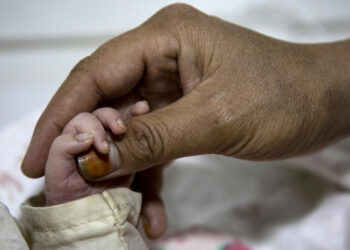At a media dialogue in Lagos, the United Nations Children’s Fund (UNICEF) called for the urgent adoption of digital birth registration in Nigeria to ensure every child’s right to an identity.
Speaking on the subject, Celine Lafoucriere, Chief of UNICEF’s Field Office for South-West Nigeria, highlighted the importance of this initiative during the two-day media dialogue held in Lagos.
The dialogue, organized in partnership with the Lagos State Ministry of Youth and Social Development and the National Population Commission (NPC), focused on driving the implementation of e-birth registration across South-West Nigeria. The event, themed “A Media Dialogue to Drive E-Birth Registration in South-West Nigeria,” brought together key stakeholders to discuss strategies for enhancing birth registration systems, News Agency of Nigeria reported..
According to Lafoucriere, “E-birth registration is crucial for national planning and development,” she stated. “It guarantees that each child is recognized and accounted for, which is essential for effective governance and resource allocation.”
Highlighting the transformative potential of e-birth registration, Lafoucriere noted that achieving comprehensive digital registration would be a game-changer for Nigeria. Accurate and reliable statistics, she argued, are fundamental for effective planning and policy-making. “Without adequate statistics, the government cannot plan effectively for children,” she said.
What to know
Denis Onoise, UNICEF Child Protection Specialist, presented the NPC’s ambitious targets: registering over nine million children under five and four million children under one year. He stressed the importance of collaborating with primary health centers to meet these goals.
Onoise also pointed out a disparity in birth registration rates, with rural areas reporting a higher registration rate (78.9%) compared to urban areas (44.8%). Integrating birth registration with the National Identification Number (NIN), he suggested, could significantly improve data accuracy and coverage.
According to Onoise, Nigeria has established 4,000 registration centers across its 774 local government areas to facilitate this process. He highlighted that the integration of birth registration with the NIN would streamline data collection and ensure every child’s identity is accurately recorded.
More insight
Bamidele Sadiku, NPC’s Lagos State Director, echoed these sentiments, stressing that the e-birth registration platform would enhance the quality of life for Nigerians by preventing duplicate registrations of births and deaths. Sadiku revealed plans to collaborate with the National Identity Management Commission (NIMC) to link birth registrations with NIN, creating a unified and reliable database.
“Linking e-birth registration with NIN will resolve issues of multiple registrations and provide a unique identity for every child born in Nigeria,” Sadiku explained. He called on the media to support this initiative, emphasizing the crucial role of public awareness in its success.
Toyin Oke, Permanent Secretary of the Lagos Ministry of Youth and Social Development, reiterated the state government’s commitment to securing children’s futures through e-birth registration. Represented by Adeola Olabisi, Director of Public Finance, Oke acknowledged the media’s vital role in promoting the initiative and ensuring its widespread adoption.
UNICEF’s advocacy for digital birth registration aims to create a robust and comprehensive system that supports national planning, enhances child rights, and ensures that every Nigerian child is counted and recognized.



















